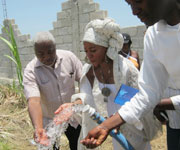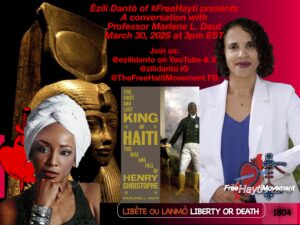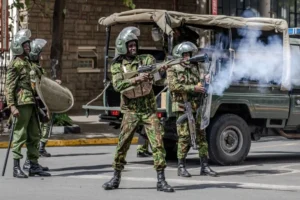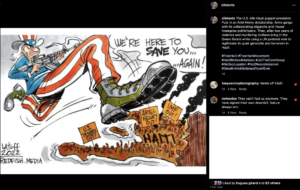*****************Solidarity with Haiti: Ezili Dantò of HLLN in Toronto (Photo)| (See also: Ezili Dantò on the election of Michel Martelly ; Beating back the elite’s rabid rage; Seismic shifts and Avatar Haiti)
*****************

Rebuilding on Quicksand: Haiti after the US (s)election
An analysis by Ezili Danto of HLLN
After reading, Rebuilding on Quicksand: Haiti After The Run-off Polls – Analysis written by ISN Security Watch, I decided to publish the thoughts that came to mind as I read this piece, this self-styled “analysis” of the Michel Martelly election in Haiti because it affords the opportunity to clearly illustrate the repugnant nature of the UN self-interest in doing US bidding in Haiti to preserve its existence no matter that the US/France/Canada requires it to undermine the rule of law; it affords us the opportunity to look at what power means when the most powerful use their power to undermine decency, morality, ethics, established law but calls it “bringing free and fair elections, human rights, stability, democracy and reconstruction” to Haiti.
How does the least powerful gathering of peoples on earth, living in Haiti, facing evil, survive this moral depravity imposed by the highest of supposedly “developed” and “educated” minds on the planet?
In a way the “analysis,” written by ISN Security Watch on the Martelly “election” is unlike most of the embedded media’s State Department bulletins because it recognizes the non-violent nature of the people of Haiti and their great self-discipline. But it falls way short because the reason it touches on the truth is to further a lie, that is – to perpetrate the colonial narrative that the US/international community actually have a genuine interest in “good governance,” social inclusion, equality and rule of law in Haiti.
But these seemingly well-educated, PHD-holding authors of this “analysis” on current Haiti, who clearly were stretching credulity to obfuscate and micromanage the lies of a benevolent, so-called “international community,” concerned with the “rule of law” in Haiti, managed to touch on something that is invisible to most Westerners about Haiti.
They inadvertently glimpsed the POWER of the Haitian masses that the concrete, hierarchical, formal power of the world’s SUPERPOWER nations discount but cannot yet destroy, even with these rigged elections, the two (1991/2004) Bush coup d’etats and regime changes, their UN proxy occupation and return to disenfranchisement (Duvalierism/dictatorship) served under the “clean” serviette of Michel Martelly’s carnival music, Wyclef Jean’s hip hop fame, Hollywood Sean Penn/Charlie Sheen’s “valuable” human outreach to bring value into their lives, not to mention, masked by Anderson Cooper’s seeming “thorough” CNN coverage of the dramatic earthquake!
Terror, re-enslavement, rape, slaughter, imported deadly diseases have not seen such a beautiful face-lift since the time of the “Enlightenment!?” and the US/Euros and their slave catchers where sailing for “adventure, conquest, missionary evangelisms and empire-building,” financed, of course, in that times’ then rational and scientific age of reason, by the, uhmm, Triangular Trade.
The poor Haitian masses being starved, raped, murdered and excluded as human beings capable of self-rule in the 21st century has never been so well packaged for public consumption. The CIA, Pentagon and Obama’s Administration, following the Bush/Clinton trajectory (with the complicity of the discredited UN, most of the Caribbean, Latin America, the European Union and Canada), have certainly succeeded in hiding the genocide and ethnic cleansing their committing in Haiti.
The article entitled “Rebuilding on Quicksand: Haiti After The Run-off Polls – Analysis” begins to glimpse the problem of the international community’s complicity in disenfranchising the majority of the people of Haiti in favor of its own institutionalized worldview and institutional concept of governance and order. Admits that:
“Since the earthquake in January 2010, Haiti has not witnessed a full-blown breakdown of social order despite: the enormous pressures on citizens and communities; rising crime and violence against women and girls in the tent cities; the cholera epidemic; a largely paralyzed central government; and a disunited and segregated international community. This means that forms of governance are at work outside of, and in interaction with, formal institutions and the donor agencies.”
But this article fails to recognize what this actually means. For one, if there is no need for UN/US high handed pressure to force through even a rigged and non-inclusive election, why do it? Why do it if there was and is an informal, non-institutionalize, self-governing system of the Haitian people that regulates chaos and disorder and prevents a full-blown break down of the current social “order”????
“Effective, accountable and legitimate relational governance” in Haiti has NEVER been acknowledged because of the colonial narrative that denies Haiti has its on internal authority separate and apart from the predatory state, the global corporatocracy and Haiti Oligarchy. But Ibo Granmoun lakay Ibo – Haitians are their own authority. It’s non-institutionalized in the Western sense and thus invisible to PHD governance theorists. Still “Viv,” “Lakou,” and “Konbit” exist (Ibo Granmoun : The Roots of Haitian Democracy: and Vodun Konbit and Vodun Lakou.)
Moreover, as long as the post-WWII Western powers continue to strategically deny that they have VITAL interests in Haiti, including in taking its iridium, oil, natural gas, uranium, copper, gold, soil for super anti-biotics, deep water ports, et al”¦ there can be no truthful conversation about governance; why the rush of the international community to continually disenfranchise the masses in Haiti, who OWN more property than any other indigenous folks in the Caribbean. As long as the PhD’s of the Western world continue to value only wage workers as workers in Haiti and value not the backbone informal economy, the African culture, continue to regurgitate the myth of the violent Haitians; as long as the colonial narrative reigns, what’s obvious remains invisible and the false benevolence of the discredited former slave-holders with the UN Security Council preserving the Breton Woods colonizing/dominating institutions as “progress” shall continue the past towards the future. But note, Haitians have existed beyond all attempts at genocide and cultural assimilation of the Dominion. Because Ibo Granmoun, lakay Ibo.
In Afghanistan, the US and internationals pushed fraudulent and rigged elections in the interests of “their eternal verities” as in Haiti regardless of the people’s priorities. It’s a failed system. It will continue to cost the West and harm the innocent in Afghanistan and in Haiti”¦ Building on quicksand indeed! is shortsighted and even criminal with these Rwanda figures the UN-imported cholera is bringing (800,000 expected to be in infected) to the innocent in Haiti who are being “stabilized!” at all cost.
Haitian rule of law is of no interests to the Breton Woods adherents who divided the non-European countries as theirs. Manifest Destiny, Monroe Doctrine, Dollar Diplomacy does that allow for authentic Haiti self-rule? Neither does unfair trade policies that destroy Haiti’s local economy and production while devaluing the only real aid Haiti gets – the Diaspora’s over $2billion per year remittances. Reconstruction, as envisioned by the post-WWII powers for Haiti, is just more of the same – making Haiti a dependent, subservient market for the US, Canada, France. Nothing in there is about Haiti self-rule, healing, dignity or authentic governance . The authors here, discount the 2004 bicentennial Bush Regime Change in Haiti and UN 7-year presence that the people of Haiti request an end to. The UN was asked to come in to help uphold a member nation’s Constitutional government. It came in, in 2004 at the behest of Bush/Condi/Colin to take down the rule of law and empower the Duvalierists, the NGOs and Haiti Oligarchy. How can the UN talk about “rule of law” when its the proxy presence for US geopolitical and raw material needs in Haiti. This article eventually just drones on about the US and international community’s interest in Haitian human rights and good governance, ignoring these institutions very push for lawlessness, for profit-over-people and thus like the rest of the Western narrative, fails. It deals in self-serving propaganda, not facts. Like why is Haiti riches not part of the reconstruction dialogue, but false international benevolence towards Haiti sovereignty and domestic self-rule, is?
For some information on Haiti’s indigenous leadership structure that is invisible to the neocolonial mindset; the indigenous Haiti structure that authorizes ITSELF and gets power from source; for info on Haiti’s fundamental non-hierarchical, “informal” leadership or relational governance that are self-managed Haiti teams that form, operate, dissolve and then re-form per the reality and relationships on the ground and to serve LIFE, not profit, go to Ezili Dantò’s Network on: “Vodun Konbit and Vodun Lakou” – http://bit.ly/a6AWH8 ; The Haitian union forged at Bwa Kayiman -has never wavered http://bit.ly/9uzMXS and Haitian Epistemology http://bit.ly/fBCE8B.
Ezili Dantò of HLLN
April, 2011
*****************************************************
Forwarded by Ezili’s Haitian Lawyers Leadership Network
*****************************************************
BACKGROUND INFO:
Haiti’s billionaire plunderers
Rebuilding on Quicksand: Haiti After The Run-off Polls – Analysis, April 12, 2011, Source- Eurasia Review
Rebuilding on Quicksand: Haiti After The Run-off Polls – Analysis
Written by: ISN Security Watch
April 12, 2011
A new Haitian government under Michel Martelly is unlikely to resolve the Caribbean country’s myriad reconstruction and development challenges. What Haiti urgently needs now is better governance. Haitians and their international counterparts have to work together to create legitimate public authority for rebuilding a country that does not rest primarily on formal, rules-based institutions.
By Markus Schultze-Kraft for ISN Insights
In his most recent report on Haiti to the Security Council, released on 24 March, UN Secretary General Ban Ki-moon offers a sombre account of the situation in the country. Following the 20 March presidential and parliamentary run-off polls, and prior to the Haitian Provisional Electoral Council´s release of preliminary results, the head of the world body duly acknowledged that “Haiti has the chance to make a fresh start under a new Administration”. But clearly, and rightly so, the report’s emphasis is on the big problems that lie ahead.
“The incoming Government of Haiti”, says Ban, “will inherit a set of daunting challenges, compounded by the onset of another hurricane season, a severe lack of public sector expertise and a growing disenchantment among the general population with the existing political leadership and class and the long-standing socio-economic order. The next President of Haiti may well face a protracted period of difficult cohabitation with a divided and potentially fractious Parliament”.
Looking forward, Ban highlights that “the executive and legislative branches of Government will have to work together to meet the aspirations of the Haitian people and to deliver the reforms that they have been denied for so long […] A new leadership must try to heal the wounds of a deeply polarized society and provide jobs, education and services to a population that is economically impoverished.”
Faltering reconstruction
This candid assessment reflects growing concern among the international donor community about the political and governance deadlocks that threaten to undermine Haiti´s reconstruction and longer-term development. The 20 March run-off may have averted a full-blown constitutional crisis, but nothing indicates that the contested election of Michel Martelly will provide the country a sufficiently legitimate and solid political base for overcoming the current crisis. Beyond justified preoccupations that the new president may seek to re-establish the Haitian army, abolished in 1995 and of no use to Haiti today, there is little hope that the incoming administration will muster more capacity than its predecessor to deliver basic services to earthquake victims and to address the problems of grinding poverty, increasing crime and bad governance. Amid patchy and slow reconstruction and an uncontrolled cholera epidemic, building trust between citizens and state institutions remains a formidable challenge.
Concern that Haiti´s reconstruction is faltering is mounting across the international donor community. Since the earthquake 15 months ago, hundreds of millions have been spent in humanitarian assistance, recovery and reconstruction – and more funds have been pledged. But as long as Haiti´s governance structures and those of the international aid effort in the country are not improved and reformed, progress is unlikely and attention will remain focused on a myriad of (short-term) projects, which taken together will not suffice to rebuild Haiti and increase the resilience of its state and society. As one donor government representative recently put it, “we are doomed to repeat the same mistakes if we do not at long last address the question of governance in Haiti”.
However, the task is clearly not only to improve Haitian governance, but also to change the approach to, and workings of, the international intervention in the country. The international actors who rushed in after the quake have been described as a “globalized complex of liberal governance” quite unable to fill the vacuum of a crumbled Haitian state, fragmented civil society, self-interested business sector and disengaged disapora. In effect, international donors – the most influential of which exerted considerable pressure to push through the disputed and rigged election process that led to Martelly´s victory – are currently not well placed to be successful at contributing to building a better future for Haiti.
´Rule-of-law compact´: Good idea, but is it feasible?
Looking for a way out of this quagmire, attention has begun to shift to identifying and addressing some of the underlying drivers of Haiti’s faltering reconstruction. Edmond Mulet, the UN secretary general’s special representative and head of the UN Stabilization Mission in Haiti (MINUSTAH), has been championing the creation of a ”rule-of-law compact”. “In the absence of any significant progress in the Rule of Law field in Haiti”, says Mulet, “all ongoing and future efforts for Haiti’s recovery, including reconstruction, economic and social development, humanitarian aid, security and political stability, might turn out to be unproductive. It is high time to put the Rule of Law back on top of the next government’s priority list”.
This idea is echoed by Secretary General Ban, who in the above cited report to the Security Council elaborates that “in order to achieve lasting peace and prosperity, Haitians must embrace the rule of law. This will require a genuine commitment to creating an independent and effective judiciary, a Parliament that is accountable to the people and not driven by special interests, and a Government that is transparent, responsive to the needs of the country and truly representative of the Haitian people. Furthermore, the rule of law should encompass the creation of comprehensive land and civil registries, as well as construction and building codes and commercial laws. It should manifest itself through the capacity of the State to collect taxes and guarantee adequate legal protection as a means of facilitating economic development”.
However, both Mulet and Ban are silent about the fundamental issue of how to achieve these goals in a setting as fragile, polarized, impoverished and vulnerable as Haiti after the 2010 earthquake. Indeed, a closer look at the country´s unstable and violent political history since the end of ´Baby Doc´ Duvalier´s dictatorship in 1986 must lead one to conclude that any attempt to create formal, rules-based institutions capable of changing the ways that power is exercised and distributed in Haiti stands a good chance of turning out to be yet another mission impossible.
Strengthening governance in Haiti by turning it ”upside down”
To move ahead, Haiti urgently needs better governance and, specifically, legitimate public authority that does not primarily rest on formal, rules-based institutions. In the absence of strong state institutions in the post-quake setting – and in the wake of an imperfect election process that could not have been postponed further – such public authority can only be built on the basis of enabling efficient, inclusive and transparent relations and interactions between the new Martelly administration and the Haitian state, civil society, the business sector and the international donor community.
Haitians and their international partners should now focus on designing a governance framework capable of shifting or influencing the incentives and interests of these four sets of actors in favor of a national and truly Haitian-owned project of reconstruction and development. The issue is not to lose sight of the desirable end-state of consolidated formal institutions, including the rule-of-law. But for the time being – and until Haiti has become institutionally more resilient under its own steam – the international donor community should continue to provide much needed humanitarian and quake-recovery as well as stabilization assistance; and as a matter of urgency it should support the building of effective, accountable and legitimate relational governance in the country.
Since the earthquake in January 2010, Haiti has not witnessed a full-blown breakdown of social order despite: the enormous pressures on citizens and communities; rising crime and violence against women and girls in the tent cities; the cholera epidemic; a largely paralyzed central government; and a disunited and segregated international community. This means that forms of governance are at work outside of, and in interaction with, formal institutions and the donor agencies.
It is precisely this potential that has to be tapped now in a much more strategic fashion in order to build effective public authority for reconstruction and development until formal rule-of-law and institutional governance become feasible. There seems to be no other way forward if the mistakes of previous international engagement are to be avoided – and if Haiti, at long last, is to build a future for itself that is better than its past.
Dr Markus Schultze-Kraft is Governance Team Leader and Research Fellow at the Institute of Development Studies, University of Sussex (UK). For more than 15 years, he has worked on conflict prevention/resolution, policy analysis and human rights observation/protection in and from Latin America and the Caribbean – most recently as director of the Latin America and Caribbean program for the International Crisis Group. He holds a Doctorate in Politics from Oxford University. Julia Gorricho, doctoral candidate in the School of Global Studies at the University of Sussex (UK), contributed to this article. Published by nternational Relations and Security Network (ISN)
Add a comment:
Powered by Facebook Comments









